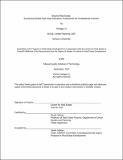| dc.contributor.advisor | David Geltner. | en_US |
| dc.contributor.author | Li, Xiangyu | en_US |
| dc.contributor.other | Massachusetts Institute of Technology. Center for Real Estate. Program in Real Estate Development. | en_US |
| dc.date.accessioned | 2013-02-15T14:41:21Z | |
| dc.date.available | 2013-02-15T14:41:21Z | |
| dc.date.copyright | 2012 | en_US |
| dc.date.issued | 2012 | en_US |
| dc.identifier.uri | http://hdl.handle.net/1721.1/77125 | |
| dc.description | Thesis (S.M. in Real Estate Development)--Massachusetts Institute of Technology, Program in Real Estate Development in Conjunction with the Center for Real Estate, 2012. | en_US |
| dc.description | Cataloged from department-submitted PDF version of thesis. This electronic version was submitted and approved by the author's academic department as part of an electronic thesis pilot project. The certified thesis is available in the Institute Archives and Special Collections. | en_US |
| dc.description | Includes bibliographical references (p. 85-87). | en_US |
| dc.description.abstract | Real estate is often considered an asset to provide long term value enhancement and to protect institutional investors against inflation risk. It is a typical real asset due to the physical form and fixed geographic location with a steady return. However, real estate has its limitations. Risks associated with it such as lack of trading flexibility, special property management expertise required, and a growth prospect not always applicable towards the short term favor have impeded certain institutional investors from allocating major investment in real estate. In management of a dynamic investment portfolio, how institutional investors look at certain real assets is the key issue discussed in this thesis. Infrastructure, for instance, which can refer to roll roads, shipping or railways, is a comparable asset with real estate as it demonstrates a term with physical form and stable income stream. There are other types of real assets such as commodity, regulated utilities, and maritime assets which are also studied. This thesis delves into the dynamic structure of an institutional investment portfolio and targets to explore the following questions: What do real assets contribute to institutional investors' traditional stock-and-bond portfolio? What kinds of correlations do real assets have with typical equity and fix-income assets? How do institutional investors strategize their investment plan by allocating real assets in their global portfolio? The thesis is designed to study the underlying factors for determining the asset allocation framework from both a qualitative and a quantitative perspective. A quantitative analysis including mean-variance optimization, downside risk, correlations, risk parity and Value at Risk will test out how various asset allocation frameworks position real assets in a portfolio. The study also brings in selected real estate indexes to examine how different parings compare with each other and what impact does illiquidity exhibits on portfolio management. An interview-based research is designed to provide understanding of institutional investors' perspective on how they apply the theoretical framework to the real world practice and how they strategize the management of investment portfolios. | en_US |
| dc.description.statementofresponsibility | by Xiangyu Li. | en_US |
| dc.format.extent | 99 p. | en_US |
| dc.language.iso | eng | en_US |
| dc.publisher | Massachusetts Institute of Technology | en_US |
| dc.rights | M.I.T. theses are protected by
copyright. They may be viewed from this source for any purpose, but
reproduction or distribution in any format is prohibited without written
permission. See provided URL for inquiries about permission. | en_US |
| dc.rights.uri | http://dspace.mit.edu/handle/1721.1/7582 | en_US |
| dc.subject | Center for Real Estate. Program in Real Estate Development. | en_US |
| dc.title | Beyond real estate : examining global real asset allocation frameworks for institutional investors | en_US |
| dc.title.alternative | Examining global real asset allocation frameworks for institutional investors | en_US |
| dc.type | Thesis | en_US |
| dc.description.degree | S.M.in Real Estate Development | en_US |
| dc.contributor.department | Massachusetts Institute of Technology. Center for Real Estate. Program in Real Estate Development. | en_US |
| dc.contributor.department | Massachusetts Institute of Technology. Center for Real Estate | |
| dc.identifier.oclc | 825115343 | en_US |
